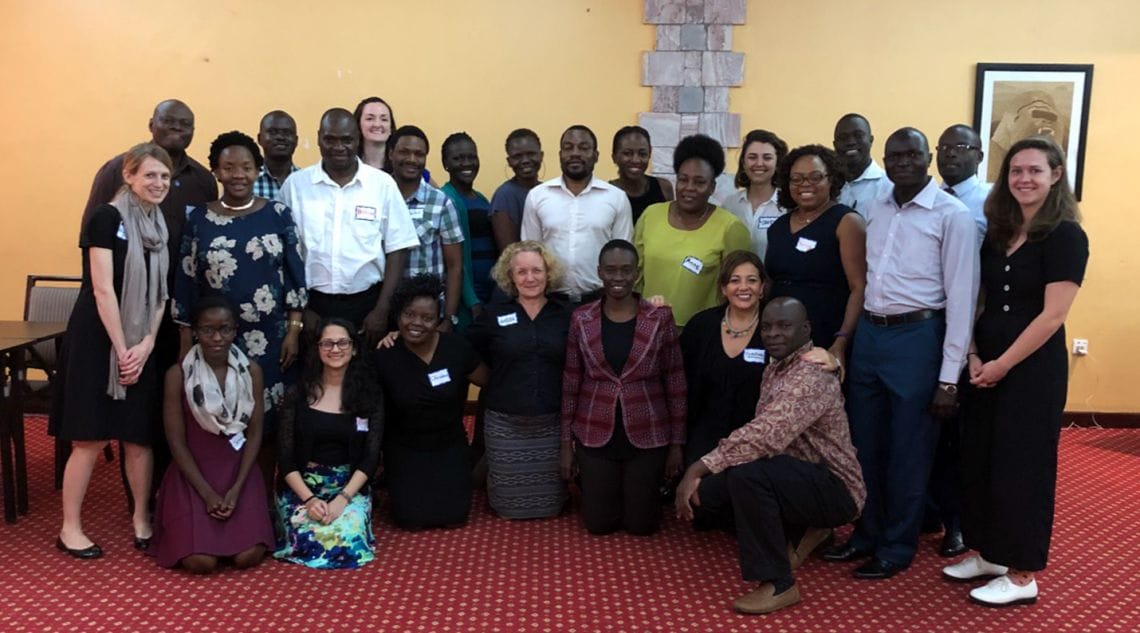
The Behavioral Design Bootcamp team facilitates a training workshop with global health partners in Kampala, Uganda.
Over the past several years, we at ideas42 have collaborated with health practitioners around the globe to make health care services more accessible and behaviorally informed. Throughout these projects our partners consistently raised one question: How can we learn to apply these behavioral insights ourselves?
As skilled and experienced health practitioners, our partners have a deep understanding of the nuanced health problems facing their respective countries. They easily identify a myriad of challenges to care, including costs, resources, information, time, and distance. But applying a behavioral lens brings a new, richer understanding of problems—and new solutions. As one health provider has said, “We realized that [the client behavior] we see happen is not straightforward, but involves a lot of decisions and actions along the way.”
By equipping our partners to apply the behavioral design methodology themselves, we can magnify the impact of these behavioral solutions. That’s why ideas42 launched the Behavioral Design Bootcamp for Strengthening Global Health, a new training model in behavioral design tailored for people working on health issues in different contexts. The program builds on our extensive capacity-building efforts, including the Behavioral Design Project for Promoting Financial Health and our NYC Behavioral Design Center that supports non-profits.
The Behavioral Design Bootcamp is a 20-month program consisting of three in-person workshops, structured assignments, and ongoing support and feedback from ideas42 coaches which we developed in collaboration with Marie Stopes International and IntraHealth International and with generous support from the William and Flora Hewlett Foundation.
Our inaugural cohort is comprised of health practitioners from eight countries in East Africa, who over the course of the program will:
- Define a problem of focus from a behavioral perspective: parsing out the key decisions and actions it involves and stripping away assumptions about what might be driving the problem or what the solution is.
- Diagnose the behavioral barriers contributing to the problem: identifying the features of an individual’s environment and experience that lead them to decide and act (or fail to do so) in a particular way.
- Design an intervention to address those barriers.
ideas42 coaches are supporting participants as they apply this methodology to behavioral problems they’ve identified within their own operations (How can we encourage men in South Sudan to accompany their wives to antenatal check-ups? What would help women in Malawi select and use contraceptive methods that meet their reproductive goals?), with the goal of launching a behavioral intervention by May 2020.
So far these teams have completed two in-person workshops and are supported with coaching calls and assignments in between. After defining problems to focus on, now teams are going out into the field to investigate which of their hypothesized behavioral barriers are driving the problem. In our next workshop, the teams will work together to develop behaviorally informed solutions.
Participants are becoming the behavioral design experts within their organizations: sharing what they learn with their colleagues and further developing the skills to apply behavioral design to a range of issues. They’re also developing connections with others in the cohort, building a network of practitioners across the region with expertise in behavioral design. And by the end of the program, each of the participants will have experienced and driven the behavioral design methodology firsthand and can continue to apply it to their work in the future to make health services easier to use for more people around the world—taking the power of behavioral insights to greater scale.
We look forward to learning about the behavioral insights brought forward from the different contexts and problems that the Behavioral Design Bootcamp participants examine in the coming months! Stay tuned to find out about the behavioral barriers and solutions they develop that may be applicable in other countries as well.


